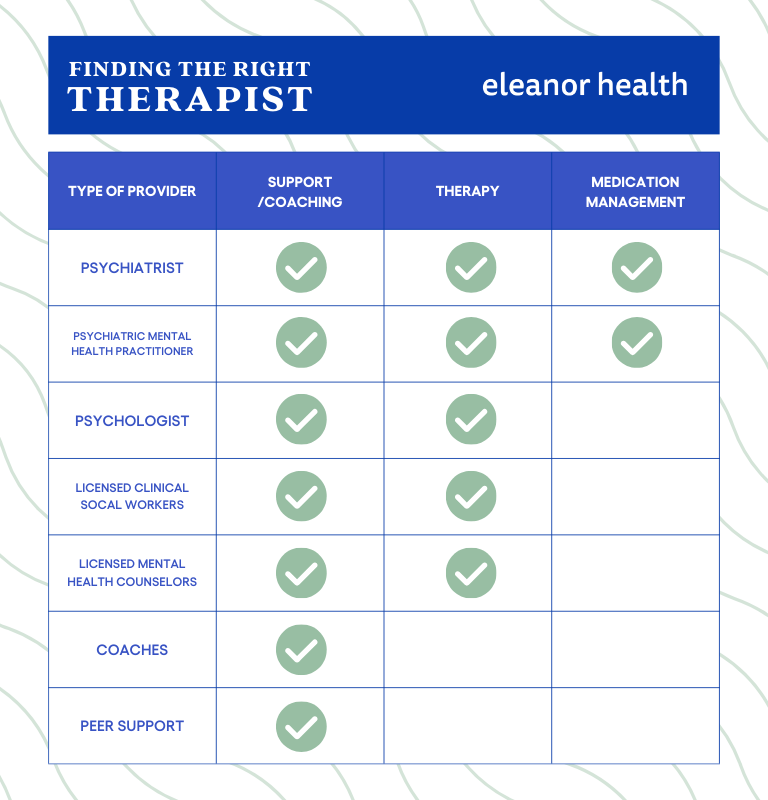Therapy and medication management are the most effective treatments for addiction and mental health treatment. Medications can help raise your threshold for tolerating stressors and therapy can help you overcome personal barriers, learn tools for symptom management and process trauma that could be affecting your day-to-day life. Therapy and medication management can be beneficial short and long term and working with a provider to decide how often to meet can help give you the support you need.
Your therapist should eventually be someone you can trust, feel comfortable with, and rely on. However, treatment for symptoms is not a “one size fits all” type of situation and care should be unique to your needs and what benefits you most in the moment. You will have a unique response to any new therapist based on your natural rapport, their therapeutic style, and your psychological disposition, so finding the right connection is not always on the first try. Additionally, some modes of treatment take longer to take effect than others and this can make it hard to tell if you’re on the right path. Setting goals, giving it time and effort, and monitoring progress is important in deciding if you’re receiving the most effective treatment for you.
When looking for the right provider, there are a few things to think about. First, note if there are any specifics that you feel are important for setting a safe foundation for treatment, such as feeling most comfortable with a provider of a certain gender or cultural background. Next, it’s important to decide what type of treatment you’re interested in. There are multiple forms of therapy and types of providers so doing some research beforehand can help guide you in the right direction; we’ve outlined some below. Finally, finding an affordable therapist/provider can be tricky so we will review some tips to help get you set up with treatment.
For individuals interested in trying out medication to help reduce or manage their mental health symptoms, it is important to connect to a provider who can prescribe medication. Only doctors and nurse practitioners can prescribe medication, although some states allow psychologists to also prescribe.
Therapy comes in many different forms and multiple types of providers can conduct therapy sessions. Some forms of therapy can focus on the past to help people gain insight over their behaviors. Other forms, like cognitive behavioral therapy (CBT), focus on the present and learning skills to improve mental health symptoms. Some people with a history of trauma can benefit from trauma-specific therapies like eye movement desensitization and reprocessing (EMDR), or trauma-focused cognitive behavioral therapy (TF-CBT). Certain other therapies can focus on improving relationships with others, like interpersonal therapy (IPT), dialectical behavior therapy (DBT) and family or couples therapy. Additionally, the most efficacious treatment for insomnia is a form of therapy called cognitive behavioral therapy for insomnia (CBT-I).
Coaches or peer support workers can help many people stay focused on their goals. It is not a form of therapy but can be helpful for additional support.

A psychiatrist is a medical doctor who is trained in both therapy and medication management to manage mental health symptoms. They have completed medical school so they are very informed about all body processes and how they can contribute to mental health symptoms. Because of the breadth of their training, they can sometimes be more expensive to have sessions with. However, if you’re someone who struggles with physical health conditions and want a provider with a strong knowledge of all body systems and can prescribe medication, working with a psychiatrist may be best for you.
Psychiatric mental health nurse practitioners, or PMHNPs, are nurses who have obtained a master’s degree in psychiatric medication management and therapeutic modalities. Since they come from a nursing background, they can be more holistic in their approach and work with patients on their lifestyle in addition to reducing symptoms via medication. If you are interested in receiving medication and want a provider who focuses on biological, mental and social factors then a nurse practitioner is a good option.
Psychologists are therapists who have received a doctorate degree (PhD or PsyD) and often conduct research for mental health conditions. They have many years of education in the field of psychology and are usually well versed in a number of therapeutic techniques and psychological testing. If you are struggling with a difficult to treat condition and want to pay for a more highly educated therapist, then a psychologist would be a good match for you.
A licensed clinical social worker is a type of social worker trained in mental health treatment. They have completed a master’s degree and are trained in psychotherapy as well as case management. That means they can not only provide therapy but also have experience connecting people to resources in the community for any environmental stressors.
A licensed mental health counselor is someone who also has a master’s degree and can provide therapy. They can specialize in counseling, school counseling and marriage and family therapy.
Coaches are individuals who can help motivate people to achieve their goals. They are not trained in therapy and are often beneficial as a supplement to therapy and/or medication management.
Peer support workers are people who have experienced mental health symptoms and/or addiction and use their experience to help others struggling with symptoms. They do not provide therapy and are also beneficial as a supplement to therapy and/or medication management.
How do you find a provider based on your needs and location? People can connect with a therapist in several different ways.
Online databases feature large lists of mental health providers. The lists can be sorted by certification, location, specialization, and personal characteristics like gender and cultural background. Here are some of the top online databases that may help you find a therapist near you.
When exploring providers, you can find out a lot with just a little research. Check to see what types of treatment they highlight in their profiles and make sure they align with your current concerns and preferences. It’s also important to note if they meet in person or virtually so you can meet with them in the setting that works best for you.
To determine if a provider is covered by insurance, first check your online insurance portal or directory. You can also call your insurance company and ask for a list of mental health providers who are inside your service plan – or a way to tell if they don’t have a list. You can also look for self-pay or alternative payment methods if your desired provider isn’t covered or if your plan doesn’t cover that specific type of treatment.
It can be beneficial to have a consult session with a provider before starting treatment. If available, it’s a great way to ask some questions before committing to a patient-provider relationship. A few important questions to ask include:
Sometimes the first provider you meet with isn’t the best fit for you. Good rapport is very important when it comes to choosing a therapist, counselor or prescriber, as is choosing someone who specializes in the type of care that you need. It’s important to give treatment at least a few sessions since often it can take time for improvements to show, however if you have been struggling to make progress with a provider or find you just aren’t “clicking” with them, it’s OK to look for someone who is a better fit.
Mental health treatment can be a rewarding opportunity to improve your life and set yourself up for personal growth. With the right provider, you can move through difficult obstacles and live the life you want to live. Eleanor Health specializes in substance use treatment and managing mental health symptoms. We offer treatment with psychiatrists, PMHNPs, therapists and peer support specialists to help you achieve your goals. For more information, contact us today.
 Therapy for Anxiety, Depression, Trauma: 3 Common Types
Therapy for Anxiety, Depression, Trauma: 3 Common Types
 Questions to Ask Your Addiction Treatment Provider
Questions to Ask Your Addiction Treatment Provider
 Common Anxiety Triggers and How to Manage Them
Common Anxiety Triggers and How to Manage Them